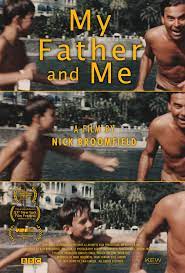
MY FATHER AND ME
UK, 2019, 97 minutes, Colour.
Directed by Nick Broomfield.
Nick Broomfield began making documentaries in 1971. He has had a distinguished career for half a century, taking on a wide variety of projects, international settings, social justice issues, portraits of significant characters, questioning. And, often he has been a strong presence in his films.
While there are sequences from some of his films in this documentary, especially his early collaborations on justice issues with his then-wife Joan Churchill, the main sequences are from his documentary on serial killer, Aileen Wuernos, and his film on Kurt Cobain and Courtney Love, especially the ending where he wanted to speak out and was escorted from the rostrum of a meeting of the American civil rights union.
However, as the title indicates, this is the story of his father, Maurice Broomfield, and his relationship with his father who died at the age of 94.
Maurice Broomfield was an extraordinary photographer, still photographs. His area, especially with the revival of British industry after World War II, was in photographing workers, plant, constructions, inventions. The photographs are extraordinarily striking – compositions, lighting… and this film is something of a heaven for photographers! We are shown many of the photographs throughout the film. Later in his life, he moved away from photography and his photos were stored away. Fortunately, there was a revival of interest, the cataloguing of his photos, and, in his older age, a series of exhibitions and lecture tours. They are certainly part of the heritage of Britain in the 20th century.
Nick Broomfield says that he didn’t have the precision of his father, much preferred making films, the continuity, narrative, perspectives.
The film fills in interesting background to the family, especially the origins in Derbyshire, Derby as the centre of industrial development, especially with Rolls-Royce, and other factories. Maurice married Sonia, a Jewish refugee after World War II. There is quite some comment throughout the film about Maurice’s mother, Daisy, xenophobic and very suspicious of Sonia, the consequence of which was that Nick did not know his grandparents until later in life, especially with Daisy coming to stay in her old age. But, it is a reminder of British attitudes and the English Channel being a barrier preserving England.
There is a great deal of personal story in this film, many home movies, photos, Nick with his sister and their parents. But, his father did not entirely approve of Nick’s vocation to cinema. And this was complicated by Maurice’s more traditional values and perspectives compared with the rather more left-wing views of his refugee wife. Nick explains that he was more in contact with his mother concerning his work and his views.
Nick is interviewed for the film by his former wife and collaborator interaction, Joan Churchill, interesting perspectives and memories about that time.
After the death of Sonia, Maurice seemed to close down. But, he encountered a woman at an art class, after having taken up painting, Suzy, and there was a bond, his companion for the last years of his life, travelling together, a new range of photos…
There is also a series of photos of Maurice with his son on one side and his grandson, Barney, on the other, over a period of years.
Of interest for fans of documentary biography, for those who admire the films of Nick Broomfield, for lovers of photography, and a British portrait from the 20th century.